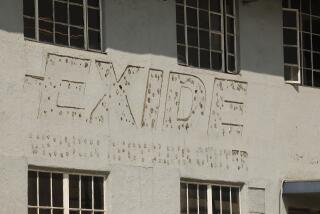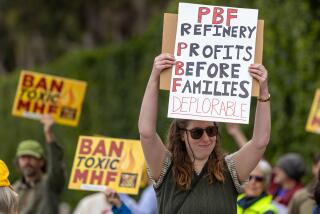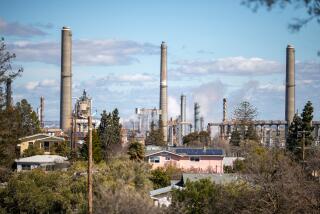Mobil Requests Westinghouse as Its Torrance Safety Adviser : Refinery: Adviser would also oversee the phasing out of highly toxic hydrofluoric acid at the plant. The city may make its nomination on Dec. 11.
- Share via
Mobil Oil Corp. has nominated a unit of Westinghouse Electric Corp. to be its choice for the court-supervised safety adviser at the Mobil refinery in Torrance.
Mobil wrote Torrance city officials last week that it favors Westinghouse’s Energy Systems Business Unit, city officials said Wednesday.
The unit is primarily involved in the design and servicing of commercial nuclear power plants, but also offers risk assessment and management services for the nuclear and petrochemical industries, said a spokesman at Westinghouse corporate headquarters in Pittsburgh.
Neither Mobil nor Westinghouse would confirm the selection, though a copy of the Mobil letter was released by the city.
The city has not yet nominated its own safety adviser candidate. It is considering two or three firms. City officials said Wednesday that they know little about Westinghouse, and it is not among the city’s finalists, which officials would not name.
“We looked to entities that would fulfill the concerns of the city and not the refinery,” said City Councilman Dan Walker.
Mayor Katy Geissert said she does not know much about Westinghouse. “I’m sure that from Mobil’s perspective, they’re well-qualified,” Geissert said.
The post of safety adviser is one of the linchpins in the resolution of the public nuisance lawsuit that Torrance brought against Mobil in 1989. The settlement, announced Oct. 18, calls for the adviser to study and make recommendations on safety at the refinery, and to oversee the phasing out of highly toxic hydrofluoric acid at the plant.
The city and Mobil are scheduled to exchange nominees’ names by Dec. 19. If they cannot agree, Harry V. Peetris, the retired Superior Court judge who is overseeing the consent decree, will pick the adviser.
City staff members are continuing to interview candidates, and a decision is possible at the Dec. 11 council meeting, Geissert said.
Mobil’s choice of Westinghouse was criticized by Fred Millar, director of the toxics project at Friends of the Earth, a Washington-based environmental group. Millar was skeptical that a company that works with the nuclear industry could be trusted to assess risks and safety at the Torrance refinery. The nuclear industry has pioneered the use of probabilities to downplay the likelihood of accidents at its plants, he said.
Mobil spokesman James A. Carbonetti said Wednesday that he could not confirm that Mobil has chosen Westinghouse.
“I don’t think it’s appropriate to comment until the selection of the safety adviser has been made,” Carbonetti said. A Westinghouse spokesman also declined to confirm his company’s nomination.
But in a letter dated Nov. 21, Mobil regional attorney David E. Novitski notified the city that Mobil is nominating the Westinghouse Energy Systems Business Unit as safety adviser.
“Westinghouse is a consulting firm of sufficient size and expertise to carry out the duties of the safety adviser under the consent decree,” Novitski wrote. “A copy of a detailed work plan and budget estimate from Westinghouse will be forwarded within a few days.”
City Councilman Bill Applegate said he does not know much about Westinghouse’s operations. “I couldn’t tell you if they were good, bad or indifferent,” Applegate said.
The safety adviser will play a central role in studying and making recommendations about a host of safety issues at the sprawling 750-acre refinery in northeast Torrance.
As part of the settlement, Mobil agreed to phase out use of hydrofluoric acid at the refinery by Dec. 31, 1997, unless it can develop a safer form of the substance and commit to a modified process by Dec. 31, 1994. The acid is used to produce a high-octane unleaded gasoline. It is considered particularly dangerous because it vaporizes at room temperature. When released, it forms a ground-hugging cloud, and industry tests in 1987 showed that a two-minute release of 1,000 gallons would be fatal to everyone exposed up to five miles downwind.
The safety adviser must approve any modified hydrofluoric acid process. It also will review and make recommendations about refinery safety, including the emergency response program, employee training, seismic safety and procedures for handling hazardous materials.
Westinghouse Electric Corp., founded in 1886, is involved in a wide range of markets, including defense and commercial electronics systems, television and radio broadcasting and financial services, according to a corporate fact sheet. It employs about 120,000 people.
The Energy Systems Business Unit is primarily involved in commercial nuclear power and some alternative power forms, said a Westinghouse spokesman. Approximately 150 nuclear reactors worldwide use Westinghouse technology, he said.
The unit does a range of “risk assessment and management services” for the commercial nuclear power industry, non-nuclear power generation and the chemical and petrochemical industries, the spokesman said. He could not say, however, if the unit has worked with oil refineries.
Ronald P. Koopman, who conducted the 1987 hydrofluoric acid tests for the industry, said he is unfamiliar with any work Westinghouse has done in the area of accidental release of toxics and related risks.
“I don’t think of Westinghouse as a safety adviser, particularly. I think of them as a major commercial enterprise,” said Koopman, who is associate energy program leader at Lawrence Livermore National Laboratory in Livermore, Calif. Ken Bossong, director of Public Citizen’s Critical Mass Energy Project in Washington, D.C., described Westinghouse’s nuclear safety record as better than some other firms involved in nuclear power generation.
“If you’re looking comparatively, then Westinghouse tends to do better than its competitors,” Bossong said.
More to Read
Inside the business of entertainment
The Wide Shot brings you news, analysis and insights on everything from streaming wars to production — and what it all means for the future.
You may occasionally receive promotional content from the Los Angeles Times.










